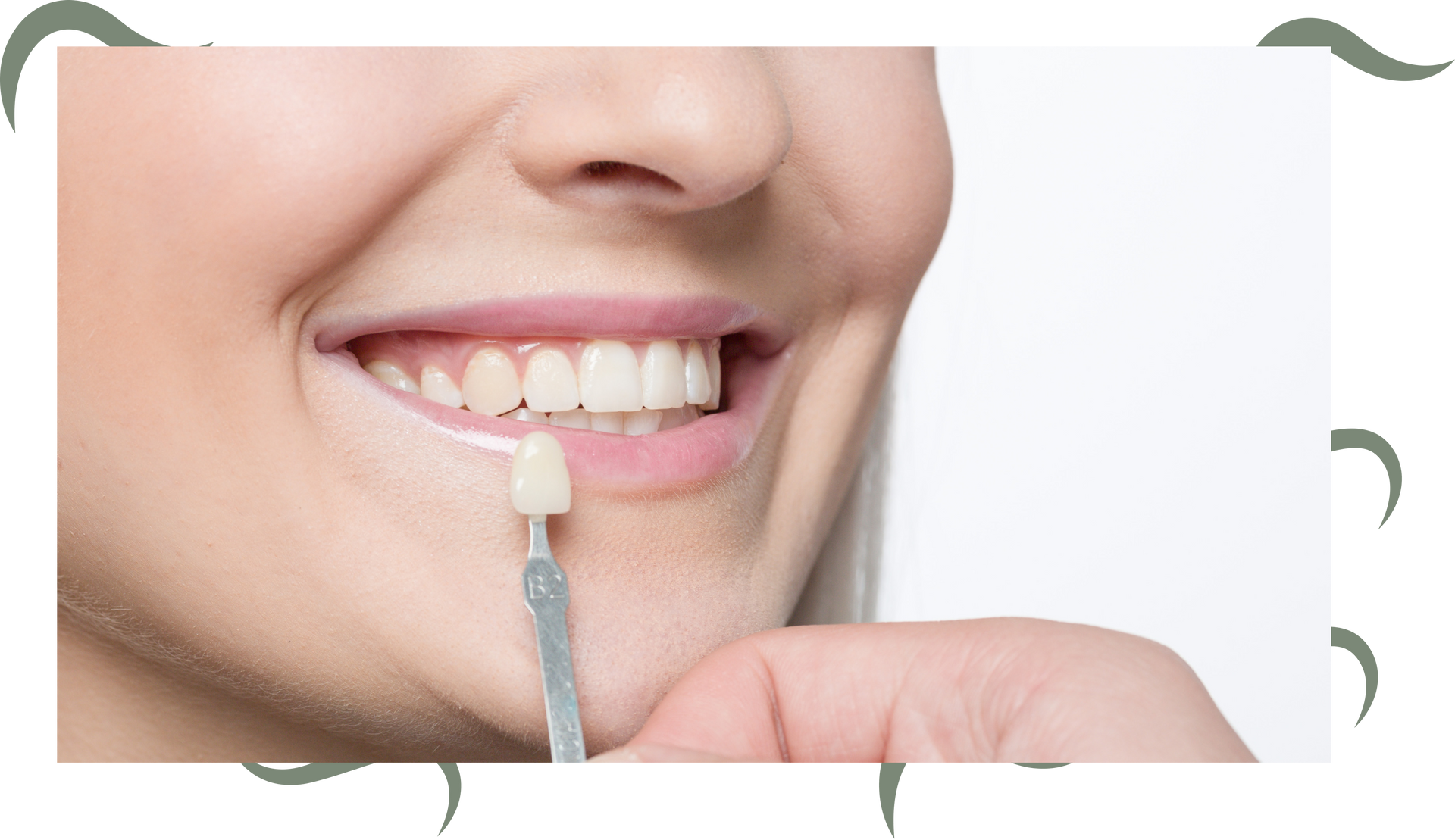What are Veneers?
Veneers are wafer-thin, custom-made shells crafted from porcelain or resin composite materials. They're designed to cover the front side of teeth, offering a quick and effective route to a brand-spanking-new smile.
Why Consider Veneers?
- Hide Those Stubborn Stains: Veneers can mask teeth stains that toothpaste just can't remove, making them a great option for those who have had too much coffee or red wine.
- Restore Chipped or Worn Teeth: If you have chipped or worn teeth, veneers can restore their appearance and protect them from further damage.
- Close Gaps and Spaces: Veneers can also be used to close gaps and spaces between teeth, giving you a more uniform and even smile.
- Correct Misaligned Teeth: For minor cases of misalignment, veneers can provide a quick fix without the need for braces or orthodontic treatment.
- Improve Tooth Shape and Size: Veneers can alter the shape and size of teeth, creating a more harmonious and balanced smile.
- Boost Confidence: With their ability to transform the appearance of teeth, veneers can greatly enhance your confidence and self-esteem.

Types of Veneers
There are various types of veneers available in the market for achieving optimum results in cosmetic dentistry. The most common type is porcelain veneers, which are preferred by dentists and patients due to their versatile and moldable nature. Other types include pressed ceramic, stacked ceramic, and lithium disilicate veneers. Each type has its own strengths and characteristics. Porcelain veneers are the least expensive and the most durable, while all-metal veneers are strong but less durable. Composite veneers are the strongest and most durable, and they can also restore damaged teeth.
Benefits of Veneers
Dental veneers can improve the appearance of your teeth. They’re custom-made, so they fit each individual’s teeth perfectly. This means they can be placed on any dental surface – front, back, top, or bottom – and look natural. Additionally, dental veneers can be used to repair teeth that have been damaged or missing due to decay or decay-related issues. Dental veneers’ many benefits include improved tooth aesthetics and increased confidence in social settings. Dental veneers are the perfect option for you if you want to enhance the look of your teeth without going through the hassle of dental surgery.
Factors Affecting Veneers Cost
Material Used
Veneers are typically made from various ceramic-based compounds, as well as zirconium dioxide. Depending on the type of ceramic used as a base, you may encounter variations such as ceramic veneers and porcelain veneers. Both are made from ceramics but of different types. Veneers made from ceramic compounds have the following advantages:
- Incredible aesthetics
- React to light like natural enamel
- Close diastemas (gaps between teeth)
- Change the shape and color of teeth
- Radically transform the smile
Porcelain veneers, on the other hand, offer a comprehensive solution to wide tooth gaps and are ideal for comprehensive smile enhancement and radical changes to teeth in the dental row.
Number of Veneers
The number of veneers needed depends on your smile, ranging from one to all front visible teeth. It is important to consult with your dentist to determine the best approach for your specific case.
Complexity of the Case
The complexity of the case is an important factor that can affect the cost of veneers. Each individual's dental condition is unique, and some cases may require more extensive preparation and treatment than others. For example, if a patient has severely damaged or misaligned teeth, additional procedures such as tooth extraction or orthodontic treatment may be necessary before veneers can be placed. These additional procedures can increase the overall cost of the treatment. It is important to consult with a qualified dentist to determine the complexity of your case and the associated cost.
Location of the Dental Clinic
The location of the dental clinic is an important factor that can affect the cost of veneers. Accessibility to the clinic plays a role in determining the overall expenses. Dental clinics located in major cities or urban areas may have higher costs compared to those in rural areas. Additionally,
local economic factors such as cost of living and demand for dental services can also influence the price of veneers. It is important to consider the location of the dental clinic when budgeting for veneers.
Average Cost of Veneers
Cost of Porcelain Veneers
The cost of porcelain veneers can vary depending on several factors. The type of dental veneer you choose and the complexity of your restoration project will affect the price. On average, dental veneers can cost anywhere from $1,500 to $6,000 per tooth. It's important to note that this is an investment in improving the appearance of your teeth and restoring their natural color.
When considering the cost of porcelain veneers, it's also important to factor in any additional costs that may be involved. These can include the cost of consultations, x-rays, and any necessary adjustments or repairs in the future. It's recommended to discuss all potential costs with your dentist before proceeding with the treatment.
Here is a table summarizing the average cost of porcelain veneers:
Veneers Cost
| Number of Veneers | Average Cost |
|---|---|
| 1 | $1,500 - $6,000 |
| 2 | $3,000 - $12,000 |
| 4 | $6,000 - $24,000 |
Please note that these are average costs and can vary depending on various factors.
Tip: It's important to choose a reputable dentist with experience in performing porcelain veneer procedures. They can provide guidance on the best options for your specific case and ensure the longevity of your veneers.
Cost of Composite Veneers
The cost of composite veneers can vary depending on several factors. On average, the cost for composite veneers can range between $250 and $1500 per tooth. The price may be influenced by the complexity of the case, the number of veneers needed, and the location of the dental clinic.
It's important to note that composite veneers are generally more affordable compared to porcelain veneers. However, they may not last as long and may require more frequent maintenance and repairs.
If you're considering composite veneers, it's recommended to consult with a qualified dentist who can assess your specific needs and provide an accurate cost estimate.
Factors Affecting Cost of Composite Veneers:
- Complexity of the case
- Number of veneers needed
- Location of the dental clinic
Please note that the prices mentioned are approximate and may vary depending on individual circumstances.
Additional Costs to Consider
When considering the cost of veneers, it's important to take into account additional expenses that may arise. These can include:
Factors to Consider When Choosing Veneers
Durability
When comparing veneers vs bonding in terms of durability and longevity, teeth restored with composite materials have an advantage over veneers. Veneers have an extremely thin structure, ranging from 0.2 to 0.5 mm, making them sensitive to loads. It is important to treat veneers delicately and avoid biting into hard foods such as apples or consuming popcorn or nuts. On the other hand, teeth restored with dental bonding can handle loads like apples or nuts quite well. Dental bonding typically retains its initial properties for 3-5 years, sometimes longer, depending on factors such as diet and oral care. Porcelain veneers, on average, last 10 years or longer, but their durability can be affected by factors such as hard foods, smoking, and bruxism.
When considering the cost, dental bonding is significantly cheaper than veneers. However, it is important to weigh the cost against the longevity and aesthetic benefits of veneers. Ultimately, the choice between veneers and bonding depends on individual preferences and budget.
Aesthetics
Veneers offer maximum color flexibility and can remarkably change the shade of teeth, giving them a pearly-white aesthetic. They are capable of restoring tooth integrity, closing gaps between teeth, and correcting tooth deformities. Veneers are often referred to as the 'kings of aesthetic dentistry' and can transform the aesthetics of a smile. Unlike bonding, which is used to restore the shape of a tooth, veneers cover natural teeth with ultra-thin ceramic or zirconium dioxide plates.
Maintenance
After getting veneers, it is important to maintain them through good oral hygiene practices and regular visits to the dentist. Brushing your teeth twice a day and flossing regularly can help prevent bacteria growth and maintain the appearance of your veneers. It is also recommended to avoid habits such as chewing on nails or ice, opening packages with your teeth, and consuming staining foods and drinks like coffee or tea. Additionally, quitting smoking can help prevent ugly stains on the teeth. By following these guidelines, you can ensure the longevity and durability of your veneers.
Longevity
The longevity of veneers is an important consideration for many patients. Porcelain veneers, on average, last 10 years or longer. However, their durability can be influenced by certain factors. Veneers do not fare well with hard foods, harmful habits such as smoking, and bruxism. It is important to avoid biting into hard foods and to practice good dental care to ensure the longevity of veneers. Dental bonding typically retains its initial properties for 3-5 years, sometimes longer, depending on factors such as the consumption of staining foods and daily dental care.
Are Veneers Worth the Cost?
Improved Confidence
Veneers can have a significant impact on your confidence by enhancing the appearance of your smile. Whether you have stains from coffee or red wine, chipped or misaligned teeth, or gaps between your teeth, veneers can address these issues and give you a more confident smile.
- Stains: Veneers can effectively mask teeth stains that toothpaste may not be able to remove.
- Fix That Wonky Smile: If you have a chipped, broken, or misaligned tooth, veneers can straighten it out.
- Fill in the Gaps: Veneers can seamlessly fill in gaps between your teeth.
Getting veneers involves a consultation with your dentist to determine if they are the right option for you. The process includes tooth preparation, where a small portion of the tooth surface is trimmed to accommodate the veneer. The veneers are then custom-made and bonded to your teeth, resulting in a natural-looking and confident smile.
Enhanced Smile
Enhanced smile is one of the key benefits of veneers. Veneers are designed to improve the appearance of teeth, giving them a natural and aesthetically pleasing look. With veneers, you can achieve a brighter, whiter smile that boosts your confidence.
Veneers are custom-made to match the color and shape of your natural teeth, ensuring a seamless blend. They can also be used to correct minor imperfections such as chips, cracks, or gaps between teeth.
In addition to enhancing the overall appearance of your smile, veneers can also improve the symmetry and alignment of your teeth, creating a more harmonious and balanced smile.
If you're looking for a quick and effective way to transform your smile, veneers can be a great option to consider.
Long-term Investment
When considering veneers, it's important to think of them as a long-term investment in your smile. While the initial cost may be higher compared to other dental procedures, veneers offer lasting benefits that make them worth the investment. Veneers are custom-made to fit your teeth perfectly and can last up to 10 years or longer. They are designed to be durable and resistant to staining, providing a beautiful and natural-looking smile for years to come. Additionally, veneers can be restored if needed, offering flexibility and peace of mind. With proper care and maintenance, veneers can continue to enhance your smile and boost your confidence over the long term.
Alternatives to Veneers
Teeth Whitening
Teeth whitening is a popular cosmetic dental procedure that helps brighten and enhance the appearance of teeth. It is a non-invasive treatment that can effectively remove stains and discoloration caused by various factors such as aging, smoking, and consumption of certain foods and beverages. The procedure involves the use of bleaching agents to lighten the shade of the teeth, resulting in a whiter and more radiant smile.
Dental Bonding
Dental bonding is a popular dental service that allows for the correction of various issues related to the integrity and aesthetics of teeth. It is used both for aesthetic correction of individual teeth or the dental arch and in conjunction with other methods. For example, during the treatment of superficial, moderate, and deep cavities, pulpitis, or periodontitis. In such cases, the dentist first performs the treatment of the tooth and then restores (or significantly enhances the aesthetics of the tooth). Dental bonding involves the use of composite photopolymer materials that harden under the influence of light from a lamp. During the procedure, the dentist recreates the tooth’s shape, fills in areas of the dental crown that were removed due to decay, and can also model or adjust the shape and color of the teeth to enhance the aesthetics of the smile. The advantages of dental bonding include improving the beauty of the tooth while restoring its integrity, strength, and functionality. It is a versatile method that can address both aesthetic and functional concerns.
Orthodontic Treatment
If you're considering alternatives to veneers, there are several options available to enhance your smile and align your teeth. These include dental bonding, teeth whitening, dental crowns, and orthodontics.
- Dental bonding is a cost-effective option that can correct minor tooth misalignments without the need for braces.
- Teeth whitening can help improve the appearance of stained or discolored teeth.
- Dental crowns are used to restore damaged or decayed teeth.
- Orthodontics, such as braces, can be used to align teeth and correct more significant misalignments.
When choosing an alternative treatment, it's important to consult with your dentist to determine the best option for your specific needs and goals.
Choosing the Right Dentist for Veneers
Experience and Expertise
Dr. Kevin Tan has been transforming smiles since 2005, bringing 18 years of expertise to your Veneers treatment. CIDC is part of Thailand's largest dental network, renowned for services like aesthetic Veneers, with over 60% international patients. The 8 E-max Veneers package includes a dentist consultation, a mouthguard, and a follow-up examination. With a clear offer that excludes transfers and accommodation, you can plan your trip with no surprises. Zero hospital stay and a 10-day hotel stay.
Patient Reviews
Patients report satisfaction with the outcome of their veneers. The use of modern techniques contributes to natural and beautiful results. Logistics. Transportation arrangements and assistance in navigating the process are valued by patients, making their experience hassle-free. Some patients express doubts about traveling, especially in uncertain times like the pandemic. There might be occasional language barriers, which can cause minor inconveniences. On Bookimed.com, you may find the choice and convenience to find the best medical solutions for Veneers in Thailand from top medical services providers just in one place, and often at competitive prices. Making sure to deliver the freshest information, the clinic’s representatives update doctors’ CVs, clinics’ capacities, before-after pictures, prices, packages, and specials by themselves shortly. Our blog and supportive pieces are created by professional authors with at least 3-year experience in medical writing and edited by medical specialists with relevant clinical and research expertise — all carefully recruited to the team.
Cost and Financing Options
When considering veneers, it's important to factor in the cost and financing options available. The cost of veneers can vary depending on several factors, including the material used, the number of veneers needed, the complexity of the case, and the location of the dental clinic.
To help you make an informed decision, here are some key points to consider:
- Material Used: Veneers can be made from porcelain or composite resin, with porcelain being more expensive but also more durable and natural-looking.
- Number of Veneers: The cost will increase with the number of veneers required to achieve the desired result.
- Complexity of the Case: If additional dental work, such as tooth extraction or gum reshaping, is needed before placing the veneers, it can affect the overall cost.
- Location of the Dental Clinic: Dental clinics in different areas may have varying pricing structures.
It's important to discuss the cost and financing options with your dentist to determine the best approach for your budget and dental needs. Remember, investing in veneers can have long-term benefits for your confidence and smile.
FAQs about Veneers
-
How long do veneers last?
Porcelain veneers, on average, last 10 years or longer. However, there are nuances that determine their durability. Veneers do not fare well with hard foods, harmful habits such as smoking, and bruxism.
- Dental bonding typically retains its initial properties for 3-5 years, sometimes much longer. This is influenced by the consumption of staining foods, hard products, and daily dental care.
- Bonding vs. veneers cost – this is arguably an important factor that influences patients’ decisions when choosing a method. The cost of veneers is several times higher than the cost of dental bonding. However, considering the longevity and aesthetic benefits of veneers, many patients find them worth the investment.
Tips for prolonging the life of veneers:
- Avoid using veneers as a tool to open or cut things.
- If accidental damage occurs, the involved veneer can be replaced.
- Practice good oral hygiene by brushing and flossing regularly.
- Visit your dentist for regular check-ups.
-
What are the advantages of veneers?
Advantages of veneers include improved aesthetics, natural-looking results, and increased confidence.
-
What are the disadvantages of veneers?
Disadvantages of veneers include the possibility of tooth sensitivity, the need for enamel removal, and the potential for veneer damage.
-
How much do veneers cost?
The cost of veneers can vary depending on factors such as the material used, the number of veneers needed, and the location of the dental clinic. On average, veneers can cost between $800 and $2,500 per tooth.
-
How are veneers applied?
The process of getting veneers involves several steps, including tooth preparation, impression taking, veneer fabrication, and bonding the veneers to the teeth.
-
Can veneers stain?
While veneers are resistant to stains, they can still be affected by certain foods and drinks. It is important to avoid excessive consumption of staining substances and maintain good oral hygiene.
-
Are veneers reversible?
Veneers are not reversible, meaning that once they are placed on your teeth, they cannot be removed without damaging the underlying tooth structure. It is important to carefully consider your decision before getting veneers, as they are a permanent solution.
However, if you are unhappy with the appearance of your veneers, they can be replaced or modified by a skilled dentist. This may involve removing a small amount of the veneer or creating a new veneer to achieve the desired result.
It is recommended to consult with your dentist to discuss your options and ensure that veneers are the right choice for you.
-
Can veneers fix crooked teeth?
Veneers are a versatile dental treatment that can effectively fix crooked teeth. By applying thin ceramic or zirconium dioxide plates to the natural teeth, veneers can create the appearance of straight teeth without the need for braces. They are especially useful for minor misalignments, where a tooth is in the correct position but slightly protrudes forward or backward. Veneers can also fill in gaps between teeth, providing a seamless and natural-looking result. Unlike braces, veneers offer a quicker and more discreet solution for achieving a straighter smile.
If you're considering veneers for crooked teeth, it's important to consult with your dentist to determine if they are the right option for you. They can assess your specific case and answer any questions you may have about the procedure and expected results.
-
What is the process for getting a dental implant with advanced technology?
The process involves detailed 3D imaging for precise planning, followed by the use of advanced surgical techniques for implant placement, ensuring optimal results and fit.
-
How can patients schedule a consultation at Bernardo Hills Dentistry?
Patients can schedule a consultation by contacting Bernardo Hills Dentistry via phone, email, or through their website to experience the benefits of advanced dental technology firsthand.
Conclusion
In conclusion, the cost of dental veneers can vary significantly, ranging from
$800 to $6,000. With the potential to save
20% - 50% through a dental savings plan, the affordability of veneers becomes more accessible. Patients report satisfaction with the outcome of their veneers, highlighting the efficacy of modern techniques. Additionally, the cost of veneers in Thailand is notably lower, making it an attractive option for those seeking affordable dental care. Overall, the decision to invest in veneers involves weighing the cost against the benefits, with the potential for long-lasting results.
Bernardo Hills Dentistry
11665 Avena Pl # 105, San Diego, CA 92128, United States
(858) 877-9307
Hours & Address
Monday: 9:00 am - 6:00 pm
Tuesday: 9:00 am - 6:00 pm
Wednesday: 8:00 am - 5:00 pm
Thursday: 7:00 am - 5:00 pm
Friday: 7:00 am - 3:00 pm
Saturday-Sunday: Closed
Navigation Links
Hours & Address
Monday: 9:00 am - 6:00 pm
Tuesday: 9:00 am - 6:00 pm
Wednesday: 8:00 am - 5:00 pm
Thursday: 7:00 am - 5:00 pm
Friday: 7:00 am - 3:00 pm
Saturday-Sunday: Closed
Navigation Links
Hours & Address
Monday: 9:00 am - 6:00 pm
Tuesday: 9:00 am - 6:00 pm
Wednesday: 8:00 am - 5:00 pm
Thursday: 7:00 am - 5:00 pm
Friday: 7:00 am - 3:00 pm
Saturday-Sunday: Closed
Navigation Links
Bernardo Hills Dentistry | All Rights Reserved



